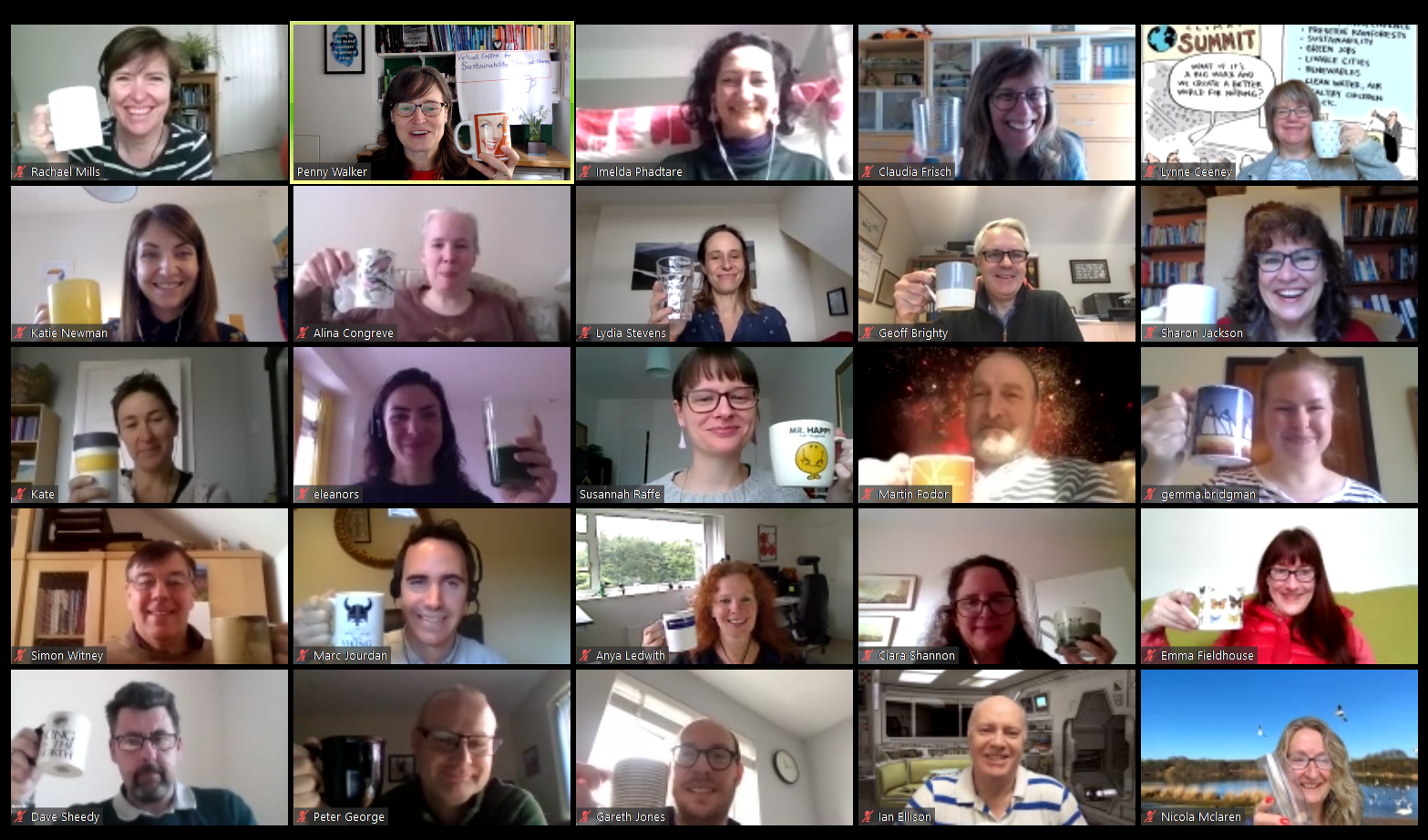Cup of tea at the ready, I waited for a few colleagues to join me for informal networking and sustainability chat. I’d arrived a bit in advance to check out the space and get everything ready. Who would come? Would we get on?
By five minutes past the start time, the Zoom room was filled with happy faces. Old friends I hadn’t seen for years, collaborators and clients from near and far, all of us sharing two things: a professional interest in sustainability and a new-found inability to get together in person.
When the country started shutting down, I immediately thought about what I could do to help my networks. A virtual coffee hour was an easy thing for me to set up, as another professional body I’m involved with – the International Association of Facilitators (IAF) – already ran virtual coffee hours each month so I had experience of attending and hosting this kind of video meeting.
There have been six virtual coffee hours for sustainability stay-at-homes so far, and they’ve settled into a good format.
I use a professional Zoom account, which people can join using their computer, tablet, smart phone or even just an audio phone call. The login needs a password, and I’ve decided to use a different login each week as a security measure.
Also for security, I don’t put the login details out into the wild. Instead, I ask people to sign up to a specific virtual coffee hour mailing list, and send the login details to this list each week.
Numbers have varied between 15 – 30 people on each call, and it attracts in-house environment and sustainability people, consultants, campaigners, councillors, and even IEMA staff! I’ve been helped out by co-hosts keeping an eye on the tech, including Susannah Raffe and Lynne Ceeney.
I run it as a meeting, rather than a webinar, so we can all talk to each other in breakout rooms. I use Zoom’s screensharing function to show slides of things like ground rules. We also use the written ‘chat’ function for introductions, sharing contact details and resources as well as parallel conversations. We take a light-hearted poll (e.g. what’s in your mug?) to test the technology, and then a poll of discussion topics to provide a starting point for conversations in the breakout groups.
The timing is generally 1/6 intros, 1/3 in breakout groups and 1/3 in plenary conversation following the breakouts and 1/6 for closing.
Sometimes people are joined unexpectedly by their partners, pets or kids, which is a lovely glimpse into people’s lives which you wouldn’t get in a real coffee house.
We take a mugshot at the end (with enough warning that people can switch off their camera if they don’t want to be in it) and ask for people to actively consent in the chat to their photo being stored and shared.
We haven’t used the shared whiteboard feature yet – who knows what collaborative drawings of a post-lockdown eco Utopia we could come up with?
People have talked about what it’s like to be working in these circumstances and tips for keeping going or giving yourself a break. Conversations have also looked at how to keep sustainability a priority and how to talk about it. E-learning resources have been shared, and people have discussed possible projects and collaborations.
Online means people can join from much further afield, and fit it in with their day without having to take time to travel. I can see us using virtual meetings much more in the future, now we all have so much more experience of what works and what doesn’t. I’ve learnt loads and I’m sure participants have too.
But most important of all, for me, has been the joyful human connection.
Do join us if you like – everything Thursday morning, 10.30-11.30 BST, until we no longer need them.
Virtual Coffee Hour for Sustainable Stay-at-Homes signup: https://bit.ly/2UeGiDV
Penny Walker’s blog: www.penny-walker.co.uk/blog

Please note: the views expressed in this blog are those of the individual contributing member, and are not necessarily representative of the views of IEMA or any professional institutions with which IEMA is associated
Subscribe
Subscribe to IEMA's newsletters to receive timely articles, expert opinions, event announcements, and much more, directly in your inbox.
Posted on 29th April 2020
Written by Penny Walker
Latest Posts
-
IA Outlook Journal Volume 21: Impact Assessment Frontiers Part 2: People, Health and Equality
- 22nd July 2024 -
IEMA responds to Carbon Border Adjustment Mechanism (CBAM) consultation - July 2024
- 19th July 2024 -
The detail and policy action required beyond the King’s Speech
- 19th July 2024 -
Energy and Housing Bills included in the King’s Speech
- 17th July 2024 -
Launch of new resource for conservation technology tools
- 11th July 2024 -
Natural Capital 101: Guide for Sustainability Professionals
- 9th July 2024